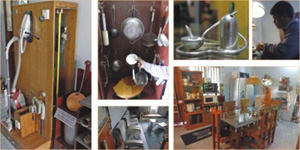The television is Sony, the washing machine is Samsung, the stereo system is Panasonic and the fridge is LG, but almost every other household implement is made by him.
Each and every item in the house is passionately designed, masterly crafted, minutely detailed and unmistakably reflects his aesthetic mind.
No doubt, one will be amazed to see the crafts of Rahmat Ullah Khan, better known as just Anwar in his small town Munshiganj, 25 kilometres southeast of the capital.
“Each item is unique, and I don’t want these to be copied, not even by me,” says a proud Anwar. There are around 300 items at his home and every single one stands out.
 What does he make? Well, what not? He redecorated his entire home and made it a living showroom. The drawing room, dining, bedrooms, kitchen, even the balconies were neatly displayed.
What does he make? Well, what not? He redecorated his entire home and made it a living showroom. The drawing room, dining, bedrooms, kitchen, even the balconies were neatly displayed.
As we were entering his house, a letterbox, hanging to the left of the door, drew our attention with a flying pigeon painted on it. “Have we forgotten pigeons were once the means of communications!” was 35-year-old Anwar’s explanation for the work.
And he has this tendency to inscribe proverbs or lines he thinks people should remember. Like the age-old saying “Time and tide wait for none”, on a clock, or “For god’s sake, don’t indulge in corruption using me”, on a penholder. In another penholder, he wrote: “Let’s plant more trees” in green ink on a picture of black smoke coming out of a factory.
The living room seemed quite like one you would see in any middle class family. Couch, tea table, a divan, several plant pots, several wall-clocks and a huge showcase for the entertainment units, which doubles as the place for small showpieces.
Knowing that every little thing there in the room was designed by him, the first question that pops up is how did he learn to do these things?
“It started with a curved nail,” recalls Anwar’s mother. “He was barely a kid when he noticed the nail and started analysing the material.”
Like most other parents, the Khans wanted their eldest son among four children to be a doctor, but he became “what he was meant to be”.
“We did not forbid him to do his stuff as he was not doing badly in school,” Anwar’s mother told The Daily Star. “If we had given him Tk 1,000 for Eid, he would get a shirt for Tk 100 from street vendors and spend the rest on tools or equipment,” she explained.
Anwar did his post graduation in geography, but continued his work on the side. Later, he finished a one-year course on interior and exterior design at a private firm in the capital, which helped him to be technically sound.
One of the fascinating features about his work is his attention to the details. He spends a good amount of time thinking about the end-users’ point of view: how to make it handy, safe and functional.
He then puts a lot of efforts into making the piece of furniture without compromising aesthetics. Sometimes it takes several months to design and troubleshoot, like a steel water-filter stand took four and a half months.
For instance, he believes screws are ugly to look at. Solution: “do not use screws and if you have to, make sure they are not visible.”
Maybe the most fascinating room in his house is the kitchen, which he totally renovated for his mother. Over the cookers, he set up a steel-frame to which he attached a handle so that one can have support of the handle with one hand while stirring with the other.
“Sometimes the heat in the kitchen can make some people dizzy and shaky, and this handle would lend support so that they don’t fall on hot utensils,” he explained. He, however, also put a mini-fan on the frame and a spotlight for better visibility.
He even designed an innovative frame for boti–traditional kitchen knife that requires one to sit to chop things–so that one can use it while standing.
Anyone doing cooking would love this boti, which has its own safety feature to prevent accidents.
He also devised two interesting tools–one for cutting green-coconuts and the other for dry pickles. The one for cutting coconuts seemed quite heavy and expensive with a fitted drill machine and a machete, but a lot of thought went into it. He made the entire process of having coconut milk an event and a lot safer.
The pickle dryer would be quite handy for housewives. As city homes do not get much sunlight these days, he made the pickle dryer, which can stick out of any balcony. Trays can be added to the dryer that has ventilation for the pickle and plastic cover to protect it from birds and insects.
He also loves drawing which at one point prompted him to go for designing logos for different organisations.
“I got tonnes of ideas, thousands of concepts to implement and hundreds of glitches to fix, but I don’t have a laboratory, tools or machinery to implement those,” Anwar grudged. “I wish some investors back me up to make those real.”
He said he is in huge debt.
Sloan Kulper, an architect and professional in product design, thinks Anwar deserves the attention of entrepreneurs.
An MIT graduate and now a Fulbright Fellow at the architecture department in Brac University, Kulper says, “Anwar is a unique self-trained designer whose passion for craft and problem-solving deserves the attention of clients and manufacturers. Bangladesh should focus on supporting this type of home-grown talent, which Anwar possesses in abundance, for the nation to be competitive in the global marketplace of ideas.”
So far, his parents have been supporting him. They have sold off pieces of land bit by bit for him and they have never complained. Well, his mother did have one complaint. He is 35, but he has yet to get married.
Courtesy of The Daily Star




















